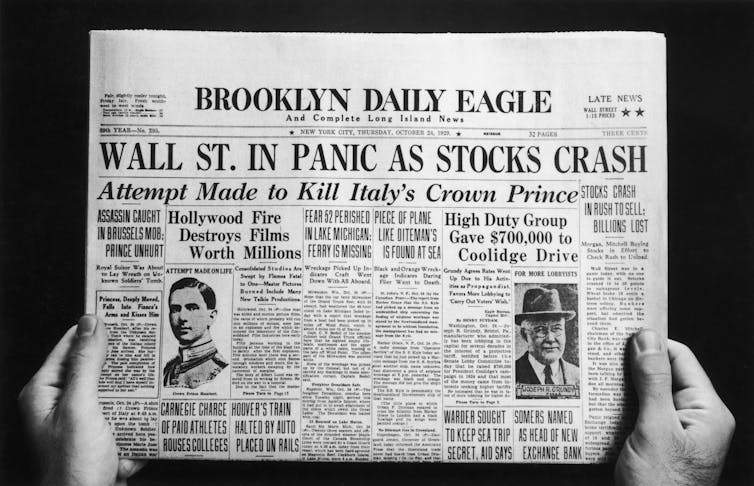Lethargic global response to COVID-19: How the human brain's failure to assess abstract threats cost us dearly
- Written by Arash Javanbakht, Associate Professor of Psychiatry, Wayne State University
More U.S. citizens have confirmed COVID-19 infections than the next five most affected countries[1] combined. Yet as recently as mid-March, President Trump downplayed the gravity[2] of the crisis by falsely claiming the coronavirus was nothing more than seasonal flu, or a Chinese hoax, or a deep state plot designed to damage his reelection bid.
The current U.S. administration’s mishandling of the coronavirus threat is part of a larger problem in pandemic management[3]. Many government officials, medical experts, scholars and journalists continued to underestimate the dangers of COVID-19, even as the disease upended life in China as early as mid-January.
The results of this collective inertia are catastrophic indeed. The U.S., along with Italy, Spain, Iran and the French Alsace, is now the site of humanitarian tragedies[4], the kind we see erupting in the aftermath of natural disasters or military conflicts. Much of the world appears inadequately prepared to recognize, let alone anticipate, when such threats occur.
Times of deep crisis offer the opportunity for new kinds of conversations. As a psychiatrist[5] studying how the human brain responds to fear and stress, and as a historian[6] working on humanitarian responses to disasters, we find surprising points of agreement on the coronavirus pandemic. From a historical and psychological perspective, there are good explanations for why so many among us fail to read the writing on the wall before a catastrophe strikes with full force.
 Beachgoers in Jacksonville, Florida on April 17. Many were not observing social distancing.
Getty Images / Icon Sportswire[7]
Beachgoers in Jacksonville, Florida on April 17. Many were not observing social distancing.
Getty Images / Icon Sportswire[7]
It’s hard to prepare for sudden change
Our failure to assess risks and make sense of calamitous events is not limited to government politics. It permeates our daily lives and social relationships. Consider the recalcitrant friend, neighbor or family member who shrugged off the seriousness of COVID-19. Think of the disinterested spring breakers[8] on Florida’s beaches in mid-March. Even in the eye of a cyclone, societies fail to come together when faced by a looming catastrophe.
Perhaps partisanship and tribal thinking hamper our ability to accurately assess risk. Maybe this pandemic is so complex that it overwhelmed existing institutional preparedness. Certainly presidential vanity, dysfunctional loyalism and personality cults, on stark display in the White House, greatly exacerbated the crisis.
That said, here’s an overarching explanation: It’s difficult for humans to adapt to sudden change. That’s because we don’t know how to tie personal experience to the broader historical context in which we live.
Put another way: We ignore history. We don’t learn from similar events or direct antecedents. We don’t consider worst-case scenarios. We don’t plot how a relatively isolated event (such as the early outbreak in China) could trigger a worldwide chain reaction.
Two examples: The Great Depression, beginning with the stock market crash of 1929, spiraled into the deepest economic plunge in U.S. history. The 1939 invasion of Poland by the Nazis violently erupted into a world war. A variety of cognitive challenges confronted those living during those times. As during the current pandemic, few saw what was coming, and few correctly assessed the long-term consequences.
 Even with the Great Depression, it took time before Americans fully understood how serious the crisis was.
Getty Images / Icon Communications[9]
Even with the Great Depression, it took time before Americans fully understood how serious the crisis was.
Getty Images / Icon Communications[9]
Distant threats don’t spur us to action
There is also a distinct psychology of threat that often hampers rational and predictive behavior. The human brain isn’t well suited[10] to assign emotional valence to what it perceives as abstract dangers. We often don’t respond appropriately to distant threats.
Instead, we function on a primordial level where close, immediate experiences will trigger a real sense of danger. Someone standing in front of you with a gun is one. An explosion from across the street is another. But spatially or temporally distant events remain intangible. As tribal beings[11], we seem much less interested in caring for a problem that might not – at least at first – be ours.
Consider President Trump’s turnaround from stubborn denial to seeming acceptance that COVID-19 could claim up to more than 200,000 American lives. Only after someone close to him contracted the coronavirus and fell into a coma did Trump seem taken aback by the tragedy[12].
As a species, we are unable to grasp abstract events that are outside our personal experience or do not occur in our immediate vicinity. Tragedies occurring in other tribes, such as COVID-19 in China or Europe, appear as vague possibilities. They elicit as much curiosity as a Hollywood movie (think of “Contagion”). To the human mind, these events seem unreal.
When a threat is temporarily or spatially distant, we will fail to correctly determine the risk of these looming events. This is true if the disaster occurred 100 years ago (like the Spanish flu) or if it will happen 100 years from now (like global warming). It’s true if the threat is 50 days or 5,000 miles away from us. As long as a threat is not in immediate proximity, we will find it difficult to imagine its repercussions. We may fail to take the necessary precautions. Somehow, we must learn not to be stubborn creatures of the here and now.
[Get facts about coronavirus and the latest research. Sign up for The Conversation’s newsletter.[13]]
References
- ^ five most affected countries (www.worldometers.info)
- ^ downplayed the gravity (www.cnn.com)
- ^ pandemic management (www.theatlantic.com)
- ^ site of humanitarian tragedies (coronavirus.jhu.edu)
- ^ psychiatrist (psychiatry.med.wayne.edu)
- ^ historian (lsa.umich.edu)
- ^ Getty Images / Icon Sportswire (www.gettyimages.com)
- ^ disinterested spring breakers (www.nytimes.com)
- ^ Getty Images / Icon Communications (www.gettyimages.com)
- ^ isn’t well suited (www.pbs.org)
- ^ As tribal beings (theconversation.com)
- ^ tragedy (www.nytimes.com)
- ^ Sign up for The Conversation’s newsletter. (theconversation.com)
Authors: Arash Javanbakht, Associate Professor of Psychiatry, Wayne State University

